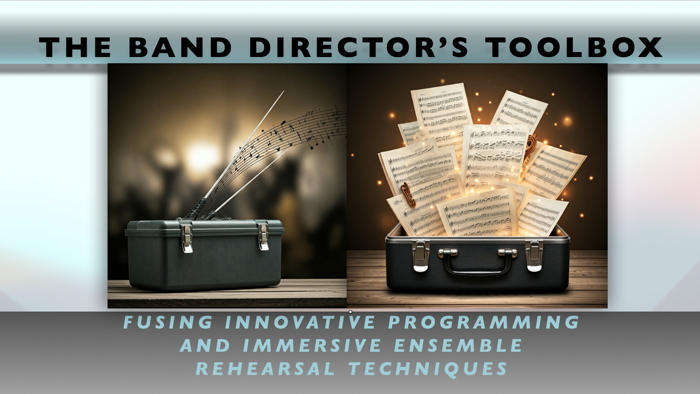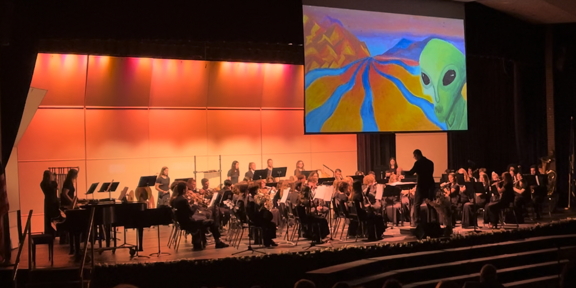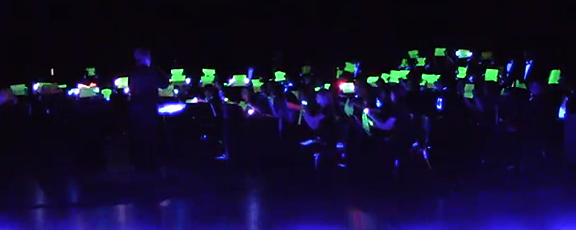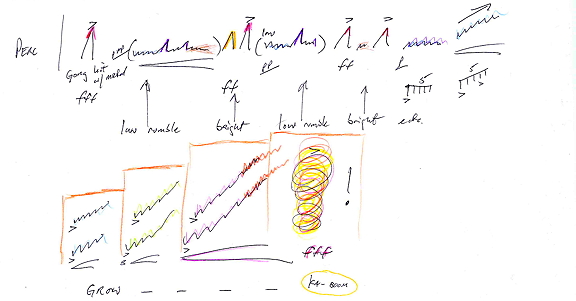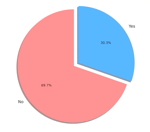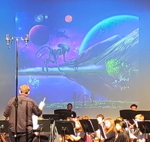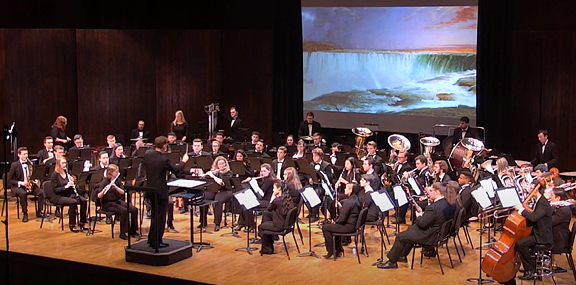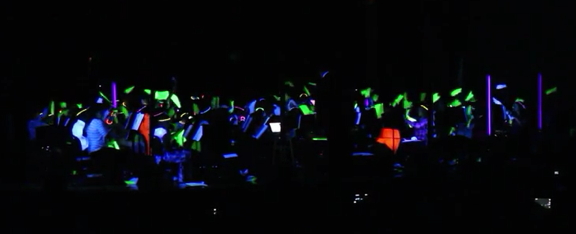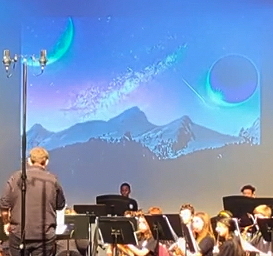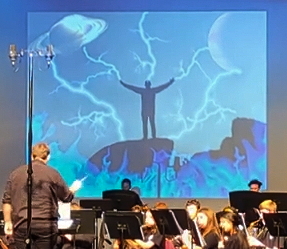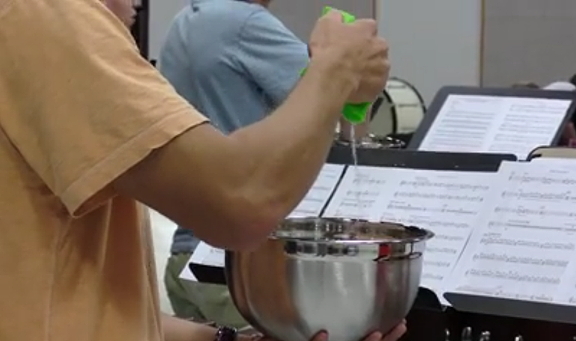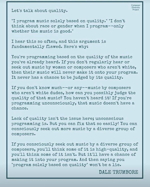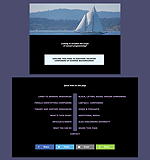|
PRELUDE:
Ensemble Rehearsals:
What Our Students Are Telling Us |
STUDENT-MUSICIAN THOUGHTS
ON IMMERSIVE REHEARSALS |
Click the pdf icon to read what students have to say about immersactive programming and rehearsals! |
|
|
MOVEMENT I:
Curating Innovative and Enticing Concert Programs
|
| A QUESTION FOR YOUR CONSIDERATION |
If the students in your band program were asked to characterize your values and your beliefs for their music education, based
SOLELY on your concert programming from the last concert season/academic year…
How do you think that they would answer?
|
|
MAESTRO CARL ST. CLAIR
ON THE PROGRAMMING
FOR A CONCERT SEASON:
"ARCHITECTURE" |
Listen to Pacific Symphony conductor Carl St. Clair
chat with Gregory Whitmore as they discuss the
"architecture of a season," and download the transcript
of the first part: |
Listen to Carl St. Clair:
|
STUDENT-MUSICIAN THOUGHTS
ON IMPROVED PROGRAMMING |
Click the pdf icon to hear what students have to say
about the music they play.
|
|
THE ARTISTIC & EDUCATIONAL
BENEFICIARIES OF YOUR PROGRAMMING |
Click the pdf icon to read the effects of concert programming
on students and their community.
|
|
PEDAGOGICAL OUTCOMES
OF IMPROVED PROGRAMMING |
Click the pdf icon to read about the strong relationship
between thoughtfully curated programming and a better education.
|
|
|
Click the pdf icon to view the document,
"Recommendations for Increased Inclusivity In Ensemble Programming."
|
|
|
MOVEMENT II:
Designing and Implementing
A More Immersive Rehearsal Experience |
| COMPOSER RESIDENCY & COLLABORATION |
When asked, "Have you ever collaborated with a living composer
in the rehearsal process?", asstonishingly, nearly 70% of respondants ansewred "no."
Let's change that! |
|
| THE IMMERSACTIVE NATURE OF DRAWING |
Click the image to read about a powerful form of engagement.
|
|
SUGGESTIONS FOR IMMERSIVE
REHEARSAL EXPERIENCES VIA
IMPROVED PROGRAMMING |
Click the pdf icon for some great ideas!
|
|
COMPOSER COLLABORATION:
STUDENT SURVEY RESPONSE HIGHLIGHTS |
Click the pdf icon to read what students have to say about
the positive impact of engaging with composers!
|
|
|
Click the pdf icon for ideas!
|
|
|
Click the pdf icon for ideas!
|
|
|
MOVEMENT III:
Planning for Artistry & Measuring Creativity |
ARTISTIC GUIDE FOR
A MORE IMMERSIVE
REHEARSAL EXPERIENCE |
Here's a set of questions that are designed to not only
help you select repertoire using a diverse lens,
but to also engage in self-reflection
about yourself and your program. Download the form, enter your responses, and gain insight!
|
|
|
Click the pdf icon to read and download the helpful guide,
"Reflection Questions For Music Educators"
|
|
|
|
| MEDIA! |
Composers Alex Shapiro and Michael Markowski love to compose for and engage with student musicians.
That doesn't just mean taking into account the parameters of a particular skill level (and then nudging the young players just a little farther than they thought they were capable of!). It means that they think about what kind of piece will be compelling to students, and will inspire them to keep playing— and maybe even try their own hand at composing!
Best of all, sometimes a compelling piece of music can be designed as an object lesson, useful for teaching a particular musical skill, or for connecting students' experiences in the band room with the rest of their growth as human beings.
Click on any of the brief excerpts and examples below to see some of the ways immersactive pieces benefit students!
|
|
| IMMERSACTIVE VIDEO EXCERPTS! |
|
|
LIGHTS OUT was designed interactively from the very beginning, when I Zoomed into the band rooms of nearly all of the 19 schools that commissioned the piece, and asked the students for their ideas about what would make a performance exciting to play and to watch. I incorporated some of their input about visuals and movement into the piece, and every one their ideas can be found in the front matter of the published score, thus giving the students a sense of agency and pride.
The score includes an additional staff line for visuals, and another one to note physical movement. These include some suggestions from me, but every band director is invited to write in the score and create their own version, thus making every performance of the piece different.
A third of the band is seated in the audience when the music begins— in the dark. After some shenanigans with the audience, like briefly kicking the seat backs to rumble and shake along with the bass drum and audio track, they make their way to the stage while playing an ostinato with the audio track and the musicians on stage. Throughout, dance moves and lighting effects make it an immersactive experience— and with an investment of $15 bucks of LEDs, it can be done on the slimmest of budgets.

Click above
to see an excerpt. |
|
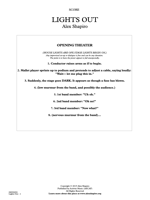
Click above
for score intro page.
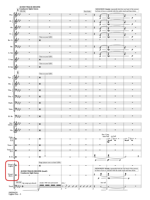
Click above
for score page 1.
Click HERE for more info
about the piece. |
|
|
THE CAVE YOU FEAR introduces certain sonic theatrics into its sound world. Students are not only asked to play minor chords and half-step dissonances, but they are invited to screech multiphonics, scrape wailing superball mallets on timpani heads, and flutter-tongue "like some kind of monster." All of these "musical sound effects" help to build an eerie, spooky, and alien atmosphere. Be sure to amplify the Lion's Roar drum over your auditorium speakers for maximum monstrous effect! It'll be sure to have your audience wondering: what was THAT???
|

Click above for excerpt.
|
|
The theatrics for THE CAVE YOU FEAR are only prescribed in the score as the aforementioned musical sound effects. However, some bands have collaborated with their theater tech departments to enhance this world visually as well. With some simple lighting design, a few stalactite-like rope lights, and endless imagination, several groups have transformed their everyday auditoriums into the deepest caverns of the Earth.
|

Click above for excerpt.
Click HERE for more info
about the piece. |
|
|
ROCK MUSIC is a piece about geology, with a potentially larger message about how climate change is affecting our planet. The band members are instructed to go outside and find two rocks that they will play during the piece— thus immediately giving them an affinity for the ground on which they walk as they look carefully at it for their materials, rather than staring at their phone screen!
When the piece was commissioned, I asked the 108 band students of 7th and 8th graders to record their rock sounds for me. Their teacher Chris Gleason then sent me the mp3s, and I used a great many of them in the audio track that goes with the piece, thus giving those students a very special, permanent collaborative experience. Chris expanded the interaction and brought a college geology professor into the band rehearsal one day, and the students learned all about the rocks in their part of Wisconsin!
The piece also invites students to gather photos and video of images that tell the story they wish to tell, and when paired with the minimalist music, becomes an emotional, cinematic journey.

Click above
to see an excerpt. |
|

Click above
for score page 9.
Click HERE for more info
about the piece. |
|
|
Here's an example of the end of TIGHT SQUEEZE, the score for which indicates places for the trumpet section, and soon after, the entire ensemble, to stand up and start dancing! The band placed cheap LED lights on the hall seats, so that the audience could become part of the party!
|

Click above for excerpt.
Click HERE for more info
about the piece. |
|
RAISING AWARENESS:
SHAPIRO: MOMENT |
When students enter a band rehearsal room, and audience members trickle into a concert hall, they are not necessarily thinking about anything in particular. But after playing and seeing a piece of music that's attached to a message, they leave with a heightened awareness that they'll share with other people they talk to.
The wind band students performing MOMENT in Montana were invited to contribute images and videos of striking moments, whether positive or negative, that related to their lives. This excerpt, for which they perfectly time their video choice to an emotional spot in the music, shows a beautiful wilderness not far from the University of Montana campus going up in flames. It was a heartbreaking, and very personal moment for everyone on stage and in the audience. It's an example of how music paired with multimedia can raise the awareness of and engage not only the ensemble members, but the many people in the audience: a wonderful form of activism.
|

Click above for excerpt.
Click HERE for more info
about the piece. |
|
|
PAPER CUT has the band members playing regular printer paper as a percussion instrument, right along with their own instruments. The paper-playing is carefully choreographed throughout the piece, and ensembles often use colored paper, or black light, to intensify the visual effect. Visuals are really fun for the students, who especially love the big reaction they get from their families and friends after the performance!
|

Click above for excerpt.
Click HERE for more info
about the piece. |
|
| THE POWER OF COMPOSER ENGAGEMENT! |
|
| SHAPIRO: STUDENT COLLABORATION via ZOOM |
Composers Alex Shapiro and Michael Markowski love to engage with student musicians and encourage their creativity in myriad ways. Whether inviting their opinions about an existing piece or seeking their ideas about multimedia performance options, immersing students in the process and valuing their input is a beautiful, immersactive approach to rehearsals!
|

Click above to watch.
|
| MARKOWSKI: STUDENT COLLABORATION IN PERSON |
Watch two positive, immersactive conductor/composer exchanges during Michael Markowski's visit to Gregory Whitmore's band rehearsal. In both videos, the students are engaged and their opinions about the music they're playing are front and center.
In the first video they're discussing Michael's piece CITY TREES, and in the second, BROOKLYN AIR.
|

Click above to watch.

Click above to watch.
|
|
|
THE TONIC OF WILDNESS is inspired by the Hudson River School of painters. Opportunities abound for concert slide-shows or collaborations with art departments... or for simple assignments like asking students to find their own favorite painting by a HRS painter.
|

Click above to watch.
|
|
Expression and creativity in music should not be separate from any other form of creative expression. Getting students to sing and clap with the music, and even to move with it, are techniques that are sometimes used in the band room. Let's add drawing to these exercises! Many students are visual, and more are synthesthic than we realize. Put colored pencils and some cheap paper on their music stands, and experiment!
Click the icon at right to see how Alex began with a sketch and turned it into the first three pages of a piece.
|
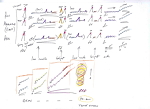
Click to enlarge.
|
|
DRAWING MARS is about Percival Lowell, a famous astronomer who back in the late 1800s/early 1900s would look through his telescope at the planet Mars and draw what he saw in his notebook. What he ended up drawing inspired early science-fiction and even led to the country believing there was indeed "life on Mars." So why not ask our students to do the same? Pick a moment from the piece, and draw that scene to life. Alternatively, this is a great opportunity to cross-collaborate with other departments on campus. Some bands have worked alongside art students and projected their work during concerts of this piece.
|

Click above to watch.
Click HERE for more info
about the piece. |
|
|
|
Have a look at a great way composers can offer band students an easy to adjust practice track, with bonus options!
|
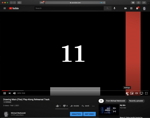
Click above to watch.
|
|
| ADDITIONAL RESOURCES |
Composer Dale Trumbore has a helpful statement about program curation.
To read it, click the icon! |
|
Alex Shapiro has created a page titled PROGRAMMING RESOURCES, which is an inspiring list of aggregated links to a great many talented composers who happen to be women, non-binary, and/or people of color. Have a look, and share the link with other conductors, educators and music-makers! |
|
| REFERENCES |
Click the pdf icon to view the references related to this presentation. |
|
Watch this space! Shortly after we give this presentation at The Midwest Clinic on December 20th, we will post a link here so you can watch it! |
|
THANK YOU!
We hope that you find these resources useful,
and that they encourage you to continue broadening
your creative approaches with your students! |
|
To contact Gregory Whitmore,
CLICK HERE to send him
a note  |
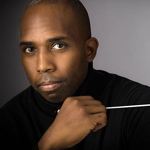 |
To contact Bill Tonissen,
CLICK HERE to send him
a note  |
 |
To contact Michael Markowski,
CLICK HERE to send him
a note  |
 |
To contact Alex Shapiro,
CLICK HERE to send her
a note  |
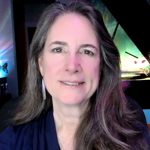 |
|
| |
